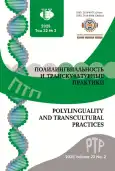Poetry by N. Akhpasheva in the Mainstream of Translingualism Theory
- 作者: Dianova L.P.1
-
隶属关系:
- MGIMO University
- 期: 卷 22, 编号 2 (2025)
- 页面: 366-379
- 栏目: LITERARY SPACE
- URL: https://journal-vniispk.ru/2618-897X/article/view/326856
- DOI: https://doi.org/10.22363/2618-897X-2025-22-2-366-379
- EDN: https://elibrary.ru/QWBFVK
- ID: 326856
如何引用文章
全文:
详细
The study is devoted to understanding the theory of artistic translingualism as a synergetic fusion of languages and cultures within a literary work. The author, creating in the acquired language, encodes reality in a special way. One of the variants of translingualism in the territory of the post-Soviet space is Russian-speaking. The Russian language acts as a “communicative bridge” to understanding the worldview of peoples whose history and culture form a unique cosmos of poetic creativity. The purpose of this work was to study selected poems by Natalia Akhpasheva, an isolingual poetess who resurrects national images of the world in her Russian-language work. Akhpasheva’s poetry, as the analysis showed, appeals to national history and mythology, which are perceived by the lyrical heroine not as relics of the past, but as a material and tangible present. The lyrical heroine herself is the bearer of many “masks”: she is a Scythian warrior and shaman, a keeper of memory and the “last sister” of pagan goddesses. The methods of description, hermeneutic commentary and interpretation were used in the analysis. The results of the study showed that in a translingual text, in which exophonic elements are absent, an original picture of the world of an ethnic group following its own teleology can be reconstructed.
作者简介
Liudmila Dianova
MGIMO University
编辑信件的主要联系方式.
Email: l.dianova56@mail.ru
ORCID iD: 0000-0001-9502-5953
PhD in Philology, Assistant Professor, Chair of the Russian Languages
76 Vernadskiy prospect, Moscow, 119454, Russian Federation参考
- Wilson, R. Cultural mediation through translingual narrative. Web. Target Online, 9 Jan. 2025, https://benjamins.com/online/target/articles/target.23.2.05wil
- Proshina, Z.G. 2017. “Translinguism and its Application.” Polylinguality and Transcultural Practices, vol. 14, no. 2, pp. 155–170. https://doi.org/10.22363/2312-8011-2017-14-2-155-170 Print. (In Russ.)
- Pajevic, M. 2019. “Adventures in Language: Yoko Tawada’s Exophonic Explorations of German.” Oxford German Studies, no. 48 (4), pp. 494–504.
- Bakhtikireeva, U.M., O.A. Valikova, and N.A. Tokareva. “At the ‘Agora’ today: approaches to the study of translingual literature.” Philological sciences. Scientific reports of higher education, no. 6–2, pp. 263–273. Print. (In Russ.)
- Vitoshnova, A.M. 2024. “Traces of native linguaculture in the works of translingual authors (based on the novels “We the living” by A. Rand and ‘Children of Vienna’ by R. Neumann).” Bulletin of the Cherepovets State University, no. 2, pp. 19–33. Print. (In Russ.)
- Litvinchuk, I.N. 2024. “’Text’ and ‘discourse’ in the era of translingualism: the relationship and interpretation of concepts.” Scientific notes of the Crimean Federal University named after V.I. Vernadsky. Philological sciences, vol. 10, no. 4, pp. 160–178. Print. (In Russ.)
- Bakhtikireeva, U.M., O.A. Valikova, and J. King. 2017. “Translingualism: a communicative bridge or a ‘cultural bomb’?” Polylinguality and transcultural practices, vol. 14, no. 1, pp. 116–121. https://doi.org/10.22363/2312-8011-2017-14-1-116-121
- Protassova, E.Yu. 2022. “Reflections on speech in the novel ‘Echelon to Samarkand’ by G. Yakhina.” Ural Philological Bulletin. Series: Language. System. Personality: Linguistics of creativity, no. 2, pp. 420–430. Print. (In Russ.)
- Novikova, M.L., and F.N. Novikov. 2022. “The Influence of Translingualism on the Formation of the Linguistic Picture of the World on the Example of Associations with Color Designations.” Philological Sciences. Scientific Reports of Higher Education, no. S6, pp. 17–25. Print. (In Russ.)
- Bakshi, N.A. 2021. “Translingualism in the Light of Semiotics (‘Maybe Esther’ by Katja Petrowskaja).” The New Philological Bulletin, no. 1 (56), pp. 79–88.
- Ovcherenko, U.V., and N.A. Tokareva. 2023. “Theory of Translingualism: Research by Stephen Kellman.” Polylinguality and Transcultural Practices, vol. 20, no. 4, pp. 684–693. https://doi.org/ 10.22363/2618-897X-2023-20-4-684-693 Print. (In Russ.)
- Kellman, S.G. 2020. Nimble Tongues: Studies in Literary Translingualism. Purdue University Press Book Previews, 2020.
- Bakhtikireeva, U.M. 2016. “On Translingualism and Transculturation through the Prism of One Language Biography.” Social and Humanitarian Sciences in the Far East, no. 2, pp. 80–84. Print. (In Russ.)
- Bakhtikireeva, U.M., and B.E. Shagimgereeva, 2020. “Linguistic Being of a Creative Personality: Bakhyt Kairbekov.” Social and Humanitarian Sciences in the Far East, vol. 17, no. 1, pp. 83–89. Print. (In Russ.)
- Bakhtikireeva, U.M. 2015. “Russian-Speaking as a Current Interdisciplinary Problem.” Social and Humanitarian Sciences in the Far East, no. 1, pp. 94-99. Print. (In Russ.)
- Kolchikova, N.L., and V.P. Prishchepa. 2020. “Ethnopoetic approach to the study of modern literature of Sayano-Altai (based on Tuvan and Khakass poetry).” New Research of Tuva, no. 3, pp. 210–227. https://doi.org/10.25178/nit.2020.3.15 Print. (In Russ.)
- Potashina, E.O. 2020. “Russian-Khakass literary connections: poetry of N. Apkhasheva.” Scientific review of Sayano-Altai, no. 4, pp. 69–74. Print. (In Russ.)
- Girutsky, A.A. 1990. Belarusian-Russian artistic bilingualism: typology and history, language processes. Minsk: University publ. Print. (In Russ.)
- Khasanov, B.V. 1990. Kazakh-Russian artistic literary bilingualism. Alma-Ata. Print. (In Russ.)
- Gachev, G.D. 2008. Mentality of the peoples of the world. Moscow: Algorithm, Eksmo publ. Print. (In Russ.)
补充文件









